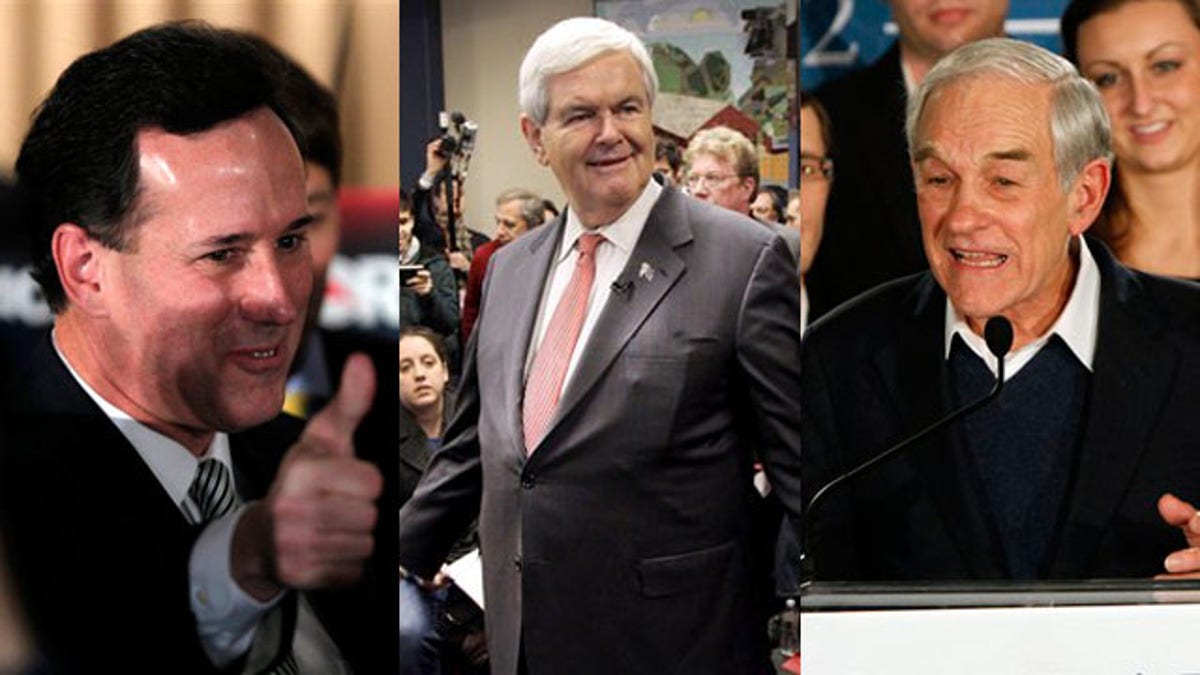
Shown here are Rick Santorum, left, Newt Gingrich, center, and Ron Paul. (AP)
The Republican presidential race is at a critical juncture. A front-runner clearly has emerged, but it's up to his rivals to prevent him from locking down the nomination.
Hence, the quest for the so-called "conservative" alternative to Mitt Romney, a journey that has now led to the great state of South Carolina.
Since 1980, the winner of the first-in-the-South primary ended up clinching the nomination every time. South Carolina doesn't pick Republicans just to make a statement. It picks nominees.
So far, a not-Romney alternative hasn't proven himself or herself. At first, it appeared Rick Perry was it. Then his numbers tanked. Shortly before Iowa, Newt Gingrich rose to the fore. Then he sank. Then Rick Santorum pulled right alongside Romney in the leadoff caucuses -- but ended up fifth in New Hampshire, a markedly less friendly state for the race's most strident social conservative.
While a few of the candidates were able to dismiss one of the first two contests as something less than critical to their victory strategy, South Carolina, which votes on Jan. 21, is critical for making their case.
"As long as the conservative opposition remains fractured, and Gingrich and Perry and Santorum all retain bases of support in south Carolina," Romney will win, said University of Virginia's Center for Politics Director Larry Sabato.
With Romney on the cusp of Republican primary greatness, the contest, which also includes Ron Paul and Jon Huntsman in pivotal, non-Romney roles, is that much more important. Here's a guide to what each candidate must achieve in nine days and how they'll try to achieve it.
Mitt Romney
The front-runner's goals in South Carolina are obvious. Stay the front-runner, and try to go 3-for-3 -- the campaign equivalent of a no-hitter, a knockout punch, a Triple Crown victory.
"He has to win, even if it's by just one vote, because he can probably shut down, for all practical purposes, the nominating battle," Sabato told Fox News. "It's almost impossible to see how any of the candidates go on if they lose in South Carolina."
Unlike in New Hampshire, a Romney victory is not a lock.
This is not his backyard, geographically or ideologically. The independents who helped Romney coast to victory in New Hampshire will be replaced by a different voting bloc -- evangelicals. And Romney's less-than-resolute record on abortion will likely be a soft spot -- one that Newt Gingrich already has started to exploit with a TV ad casting him as a flip-flopper on the issue.
While defending that record, Romney previewed his South Carolina strategy at his victory party in Manchester Tuesday night -- focusing on the economy and President Obama while evoking what is arguably his most important asset -- electability in November.
Exit polls showed, not surprisingly, that Romney led in New Hampshire among those who value over all other candidate attributes the ability to beat Obama.
And Romney introduced a new element into his messaging Tuesday night. He will challenge his competitors on their attempts to criticize him for his record at investment firm Bain Capital.
Romney's success in South Carolina may depend on his ability to command that debate, and to convince voters that his opponents are merely echoing a divisive Occupy Wall Street-style message that hitherto had no place in the Republican Party. The next 10 days for Romney may be about keeping the onset of economic populism at bay.
Newt Gingrich, Rick Santorum and Rick Perry
These candidates, in all likelihood, are hurting each other. In pursuit of emerging as the alternative to Romney, they compete for almost the same bloc of votes, and each ends up playing the role of spoiler to the rest.
"If these guys are really interested in defeating Romney, they've got to get together and come up with one dude," GOP pollster Adam Geller said.
Yet none of the three seems inclined to drop out before the South Carolina results come in so it will be up to the candidates to convince voters to anoint one of them as the clear alternative.
The goal for all of them, said Sabato, must be to definitely emerge as that "conservative alternative" -- with either a first place finish or a very close second place finish. Otherwise, it's probably game over.
Messaging will be key. This being South Carolina, the candidates may hit the social issues a bit harder than they did in New Hampshire. But striking the right balance on the economy could be the top challenge.
Other prominent conservative voices have started to speak out on the decision by Gingrich and Perry to target Romney's private-sector record.
Geller called the approach a "tactical misstep," and urged them to find a different way to distinguish themselves.
"You've got to stop with this nonsensical attack on capitalism that is better left to Michael Moore, Nancy Pelosi and their ilk," he said.
Of the three, Santorum has shied away most from that line of attack. Geller said the former Pennsylvania senator is "smart" to do so.
But Perry and Gingrich now appear to be adopting the kind of economic populist message that Santorum trumpeted in Iowa, where he finished a close second behind Romney. This makes it even harder for a consensus conservative to emerge.
Republican strategist Ron Bonjean said the candidates, faced with a lack of organization in South Carolina, are going to have to pump all their resources into ads to get their message out. He urged the candidates to let the PACs do the "dirty work" on Romney, while devoting their time on the stump and on air to defining who they are.
"This is an all-in strategy for most of these candidates," he said.
The candidates are trying to get organized as quickly as possible. Santorum just announced 169 county captains, and opened five new campaign offices.
Of the three candidates, Perry's candidacy is the most imperiled by anything less than a stellar performance in South Carolina. He launched his campaign in the state, yet has dropped to fifth place in most Palmetto polls. The RealClearPolitics.com average of recent polls shows Romney with about 31 percent support in the state, followed by Santorum with 21 percent and Gingrich with 20 percent. Ron Paul is pulling 11 percent, with Perry back at 5 percent and Jon Huntsman at 2 percent.
Perry placed last in New Hampshire, and second-to-last in Iowa. But he is keeping his chin up. He told Fox News on Wednesday that he will bring a message of limited government and social conservatism to South Carolina. His campaign claimed the state is "friendly territory for a Texas governor and veteran with outsider credentials."
Hitting the veteran theme, his campaign on Wednesday released a 60-second TV ad in South Carolina featuring former military members praising the Texas governor.
The self-proclaimed champion of personal liberty and sound monetary policy is on fire. After placing third in Iowa, Paul finished a strong second in New Hampshire and claims to be "nibbling" at Romney's heels.
South Carolina might not be as fertile for the Paul persona as the libertarian-leaning Granite State. But the Texas congressman told Fox News he has high hopes for the next contest.
His on-the-ground strategy will likely revolve in large part around courting the youth vote at college campuses across the state.
"The campuses are certainly interested in what I've been saying," Paul told Fox News on Wednesday.
The exit polls from New Hampshire support the wisdom of this strategy. According to the numbers, Paul received 47 percent of the vote among people between the ages of 18 and 29, a key voting bloc for Obama.
"We're pretty optimistic about how things will work out in South Carolina," Paul said.
As for where Paul needs to place in South Carolina, Sabato said it doesn't really matter.
Paul's campaigns have always been as much about bringing attention to issues like the Federal Reserve and America's foreign policy as they have been about winning.
"Paul is Paul. He will be in until the convention," Sabato said.
The better Paul does, the more attention the other candidates have to pay to his message and supporters, despite their inclination to dismiss his views as fringe.
Huntsman staked his campaign on New Hampshire, and placed a relatively distant third. He described the finish as a "ticket to ride" into South Carolina, but at this point he appears to be relying on little more than a New Hampshire bump to bring him into contention.
It's not clear whether that will happen.
"I think it's going to be a very, very high summit for him to climb," Bonjean said.
He said Huntsman is trying to "ride off a wave" out of New Hampshire, just like Santorum did out of Iowa. However, Huntsman's New Hampshire finish was not as world-rocking as Santorum's near-victory in Iowa. And a moderate Republican who supported civil unions for same-sex couples and caps on emissions in Utah could have a tough time in South Carolina.












































